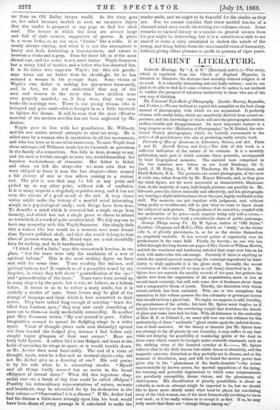Strange Things among Us. By H. Spicer, author of "Old
Styles." (London : Chapman and Hall.)—This sketch or "study" as the writer- calls it, of ghostly phenomena, is, as far as the stories themselves go, singularly readable. It has several points of superiority over its predecessors in the same field. Firstly, its brevity ; no one who has toiled through the long drawn-out pages of Mrs. Crowe or William FIowitt,, and felt the weariness and hardening unbelief that crept over him as he read, will undervalue this advantage. Certainly if there is anything to which the cynical proverb respecting the contempt engendered by fami- liarity is truly applicable it is the ghost story. Secondly, the recent occurrence of the events (if we may so call them) described in it. Mr. Spicer does not ransack the mouldy records of the past, but gathers his spirits new from the experience of his acquaintance, more or less at second-hand certainly, but still with some dew of freshness about them and a comparative bloom of youth. Thirdly, the discretion with which actual rubbish has been exclude& With one or two exceptions the narratives in this volume possess the due solemnity or grotesque horror that should environ a ghost tale. We ought, we suppose, to add, fourthly, the genuineness of the article ; but here Mr. Spicer must forgive us if initials have not for us the convincing weight that doubtless the details of place and name have had for him. With all deference to the authority. of Miss M. F. or Colonel J., we must still rest our sole reliance for the authenticity of these " authentic " ghost stories upon the judicial discre- tion of their narrator. Of the theory or theories (for Mr. Spicer does not attempt to lay all ghosts by one formula), it may suffice to say that while not denying the possibility of wandering spirits of the dead in, those cases which cannot be brought under scientific treatment, such as, the striking story of the haunted corridor at B---, Mr. Spices' believes that in the little known but subtle forces of electricity, and the magnetic currents, disturbed as they probably are in disease, and at the moment of dissolution, may, and will, be found the motive power that gives rise to the "phenomena of the death-chamber "—the noises unaccountable by known causes, the spectral apparitions of the dying, the warning, and powerful impressions to which some temperaments. are peculiarly susceptible, dream visions, and the phenomena of clairvoyance. His classification of ghostly possibilities is about as. valuable as such an attempt might be expected to be, but we should like to know more clearly under what head he places his concluding story of the bird-woman, one of the ihost fantastically revolting we have, ever read ; or if he really wishes us to accept it as fact. If so, he may- truly assert that there are "strange things among us."






























 Previous page
Previous page